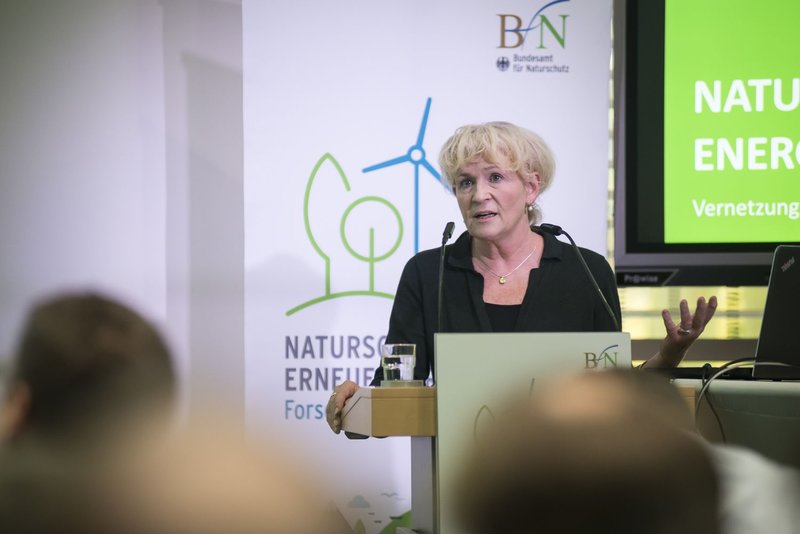What specific needs do licensing and nature conservation authorities have in order to be able to enforce species protection in a practicable way, and what good examples do current research results provide? What do current good practice opportunities look like? Where is there a need for further research? These and other questions in the context of a nature-friendly energy transition determined the agenda of the networking colloquium. Around 120 guests from the fields of species conservation as well as planning and permitting practice attended the two days of the conference (for more photos, please click on the image above).
Research for a nature-friendly energy transition
The first day, Tuesday 26 November, was opened by the President of the Federal Agency for Nature Conservation (BfN), Professor Dr Beate Jessel. Her lecture, entitled: "Species protection in the expansion of renewable energies - what can research contribute?", underscored the BfN's aim to promote a nature-friendly design of the energy transition via specified research projects. The rest of the morning focused on new research projects in the field, which were presented in short elevator pitches, as well as on pressing questions and challenges from the point of view of the licensing authorities, which were dealt with in detail in an additional thematic block.
Wind power and species protection
The afternoon of 26 November was devoted to the provocatively formulated question: Does species protection block the expansion of wind power? Four keynote speeches were devoted to the topics of standardisation, species protection in an EU comparison, obstacles to the expansion of wind energy and legal action by associations under nature conservation law. Afterwards, a panel discussion brought together different perspectives on the topic - and opened up intensive discussions with the expert audience, who were expressly invited to contribute their expertise. The first day of the conference ended with an evening event dedicated to social exchange.
Research and practice in exchange
On 27 November, which was a half-day conference, the results of advanced or completed research projects were presented. These were the projects: "Monitoring EE: Renewables in nature conservation monitoring", "ProBat - Intelligent wind turbine operation management for the protection of bats as a permit condition for wind turbines" and finally "Accept EE: Acceptance-promoting factors of renewable energies". Following this, open working groups were formed on the basis of the various contributions to the discussion, in which those present from research and practice were able to engage in an intensive exchange.
Network colloquiums "Nature Conservation and Renewable Energies"
Since 2015, the Federal Agency for Nature Conservation (BfN) has invited participants once a year to the major network colloquium in the thematic field of "Nature Conservation and Renewable Energies". With changing focal topics, the event sheds light on current research in the BfN thematic field, which deals with central questions of a nature-friendly energy transition, and offers a platform for intensive exchange. After the protection of the landscape was one of the main topics last year, the focus of the event in 2019 was on species protection.

